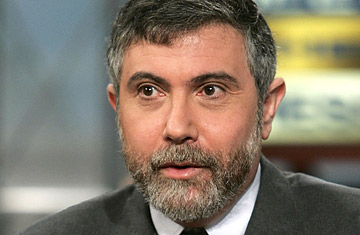
Economist and columnist Paul Krugman
On Oct. 13 Paul Krugman, a professor at Princeton University and Op-Ed columnist for the New York Times, was named the 2008 recipient of the Nobel Prize for economics. Krugman is perhaps best known as a scathing critic of the Bush Administration, which he has accused of everything from mishandling foreign policy to promoting a fiscal strategy that caused the economic crisis gripping the country. But the economist — whom the Nobel committee recognized for his "analysis of trade patterns and location of economic activity," which helps explain why certain countries excel in international trade — has long been considered one of the brightest lights of the dismal science. He will receive $1.4 million for the award, which will be given in Stockholm on Dec. 10.
Fast Facts:
• Krugman, 55, grew up on Long Island. As a child he developed a keen
interest in science fiction novelist Isaac Asimov, whom he credited in a
1995 essay with nudging him toward the study of economics
• He attended public school before receiving degrees from Yale (B.A. in 1973)
and M.I.T (Ph.D in 1977). In 1976 he briefly worked for the central bank of
Portugal as part of his doctoral coursework
• Married to economist Robin Wells
• In 1991, he was the recipient of the John Bates Clark Medal, which is given
every other year to "that economist under 40 who is adjudged to have made a
significant contribution to economic knowledge."
• Taught at Yale and M.I.T. before briefly joining the Council of Economic Advisors under Ronald
Reagan in 1982
• The author of 20 books and more than 200 academic papers
• Has been at the Times — where he maintains a blog called The Conscience of
a Liberal — since 1999, and at Princeton since 2000
Quotes about Krugman:
• "The best claimant to the mantle of John Maynard Keynes." — economist Brad DeLong)
• "The rare professional economist who knows how to explain the essence of
policy issues to a non-professional audiences." — Peter Passell, in the New York Times Book Review
• "You could think of Krugman as a sort of highbrow version of [a magician]who goes around telling the real story of how rivals bend spoons." — Michael
Hirsch, Newsweek
Quotes by Krugman:
"Washington was first thrilling, then disillusioning...Some people get
addicted to that thrill, and will do anything to stay near the center. After
a little while, however, I began to notice how policy decisions are really
made. The fact is that most senior officials have no idea what they are
talking about: discussion at high-level meetings is startlingly primitive."
("Incidents from My Career," 1995)
"I think I understand why so many people think that economics is a boring
subject, but they are wrong. On the contrary, there is hardly anything I
know that is as exciting as finding that the great events that move history, the forces that determine the destiny of empires and the fate of
kings, can sometimes be explained, predicted, or even controlled by a few
symbols on a printed page. We all want power, we all want success, but the
ultimate reward is the simple joy of understanding." ("Incidents from My
Career," 1995)
"Republicans, once hailed as the 'party of ideas,' have become the party of
stupid. (New York Times, Aug 7, 2008)
"To be absolutely, totally honest I thought this day might come someday, but
I was absolutely convinced it wasn't going to be this day. I know people who
live their lives waiting for this call, and it's not good for the soul. So I
put it out of my mind." (On receiving news of his Nobel prize; New York Times, Oct. 13, 2008)
